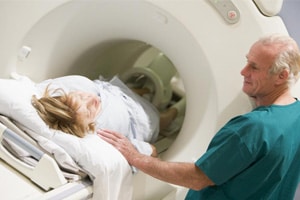
The Food and Drug Administration (FDA) has issued a safety communication advising that rare cases of underactive thyroid have been reported in infants after the use of “contrast dye,” for X-rays and other medical imaging procedures. In all of the reported cases, the infants were either premature or had other serious underlying medical conditions. Based […]

Underactive Thyroid in Some Infants Using Iodine Contrast
The Food and Drug Administration (FDA) has issued a safety communication advising that rare cases of underactive thyroid have been reported in infants after the use of “contrast dye,” for X-rays and other medical imaging procedures.
In all of the reported cases, the infants were either premature or had other serious underlying medical conditions. Based on available evidence, the agency believes that this rare occurrence is usually temporary and resolves without treatment or any lasting effects.
The thyroid controls metabolism, which affects such things as body temperature, heartbeat, and how well the body burns calories. With too little thyroid hormone, body processes slow down and the metabolism becomes sluggish, WebMD explains. If the condition persists, the baby may not grow properly and may have poor muscle tone and other symptoms.
The FDA approved label changes for all iodinated contrast media (ICM) products to include information about these cases. No changes to current prescribing, administration, or monitoring practices are recommended. The agency will continue to evaluate this issue and will update the public when there is additional information. Manufacturers of ICM products have been required to conduct a study to further investigate this safety issue.
Iodinated contrast media are drugs containing iodine that are administered to patients to enhance the ability to see blood vessels and organs on medical images such as X-rays or computed tomography (CT) scans. Images using contrast media provide greater detail to help health care professionals diagnose potential problems.
The FDA recommends that parents and caregivers contact their baby’s health care provider for additional information about these products or if they have concerns about their baby receiving an ICM product. Infants typically do not show any visible signs of underactive thyroid. Health care professionals should continue to follow the label recommendations for ICM products. They should continue to use their clinical judgment to determine if testing for underactive thyroid is necessary.
In addition, the FDA encourages health care professionals and patients to report adverse events or side effects related to the use of these products to the FDA’s MedWatch Safety Information and Adverse Event Reporting Program: www.fda.gov/MedWatch/report. Reports can be made online, by mail, phone, or fax.


